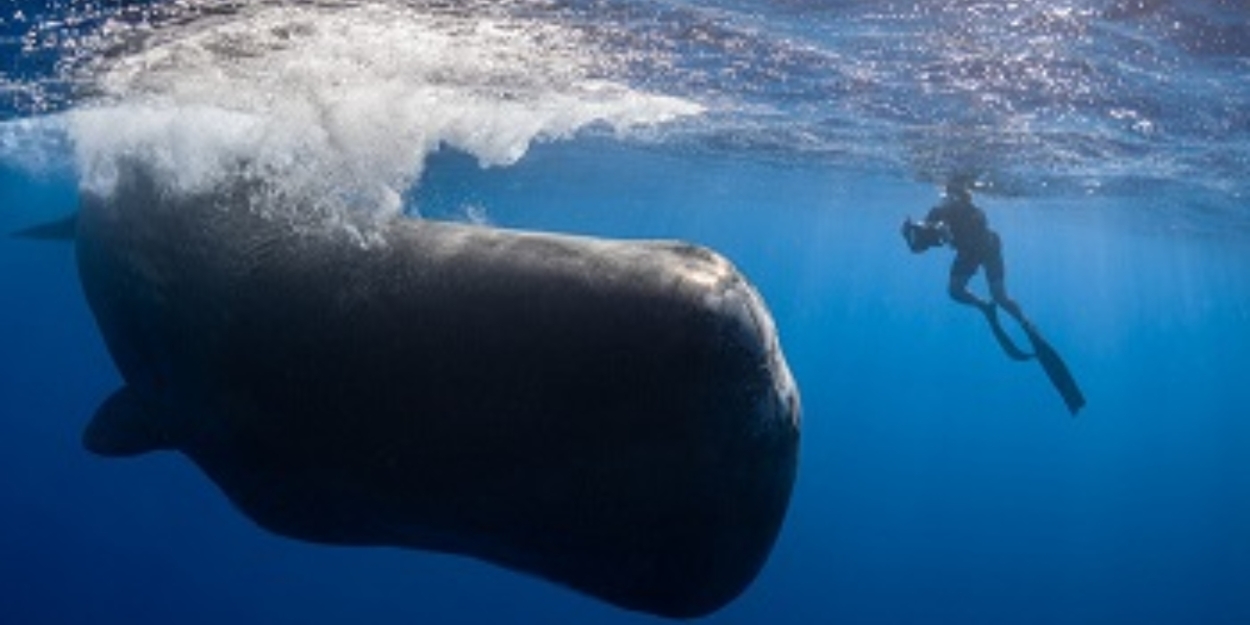Review: PATRICK AND THE WHALE at Sedona International Film Festival
The 72-minute documentary, directed by Mark Fletcher, will screen on Thursday, February 23rd at 1:00 p.m. (Alice Gill-Sheldon Theatre) and Saturday, February 25th at 1:10 p.m. (Harkins Sedona 6 - Theatre 2) in Sedona, AZ.

Throughout the ages, the whale has been an enigma and source of wonderment to theologians and mystics, writers and artists, scientists and oceanographers.
Painted Peruvian pottery from as far back as the sixth century B.C. reveals the fascination, if not the fear and reverence, that primitive societies had with the Cetacean.
The Leviathan, often referred to in the Old Testament ~ and most notably depicted in the morality tale of Jonah and the whale ~ and then in the New Testament (Revelation 13) is portrayed as a monstrous enemy of the virtuous.
Herman Melville's classic allegory, Moby Dick, echoes the Biblical notion of the whale as a menacing creature and the embodiment of evil that only an obsessed Ahab can defeat.
Oceanographers and environmentalists study whales to better understand their role in the health of the marine environment, their impact on climate change, and their distinctive attributes in communication and echolocation.
In marked contrast to the above explorations, Patrick Dykstra, an acclaimed marine videographer and British Academy Film Awards-winning wildlife photographer (Blue Planet II) dives deeply in a uniquely different direction to understand the relationship between "the great fish" and "man."
In PATRICK AND THE WHALE, one of the featured documentaries in this year's Sedona International Film Festival, Dykstra engages in a years-long quixotic quest to fathom the emotional relationship that evolves between him and a sperm whale named Dolores.
With grit and determination, Dykstra and his crew navigate the seas over a decade of seasons and track the movements of the whale. In due course, he discovers truths about the special connections that whales share that can be either a blessing or a peril.
In a pivotal, painful, and dramatic moment, he finds ten beached sperm whales ~ all dead, because the communal bond that connects one whale with others leads each whale to follow the other to their shared and untimely demise.
Yet, it is this attribute of bonding that drives Dykstra to pursue Dolores with resolve.
His tenacity culminates in an epiphanous scene that, it seems, only nature could have choreographed and is thankfully captured by his camera crew. A circle of whales envelops him as if they had formally invited him (as Dykstra describes it) into their intimate family reunion.
While Dykstra may at times anthropomorphize the whales, what other way can there be to acknowledge the distinctive attributes of this mammal ~ the mysteries of its capacities in bonding, communication, echolocation. He shares these few and critical insights about what there is to learn from the creature while acknowledging that there is so much more yet to uncover and understand.
In this vein, David Attenborough's introduction to Blue Planet evokes a similar and reenforcing perspective: "The oceans, seemingly limitless, invoke in us a sense of awe and wonder, and also sometimes fear. They cover 70% of the surface of our planet, and yet they are still the least explored. Hidden beneath the waves, right beneath my feet, there are creatures beyond our imagination."
Consider Patrick Dykstra's documentary an invaluable and elegant contribution to revealing these mysteries of the deep.
Directed by Mark Fletcher, the film is a virtual feast of spectacular cinematography and sound recording ~ a collaboration that is enhanced by the music of Matthew Atticus Berger and H. Scott Salinas and camera work that captures the gentle giants of the deep and their fellow traveler in an emotionally captivating ballet.
The overall effect of the film is to leave the viewer with a sense of reverence and respect for both the film makers and the subjects of their devotion.
The 72-minute documentary will screen on Thursday, February 23rd at 1:00 p.m. (Alice Gill-Sheldon Theatre) and Saturday, February 25th at 1:10 p.m. (Harkins Sedona 6 - Theatre 2).
The Sedona International Film Festival returns for its 29th Season from February 18th to the 26th.
Sedona International Film Festival ~ Saturday, February 18th- Sunday, February 26th ~ https://sedonafilmfestival.com/
2023 Film Festival Schedule @ https://sedonafilmfestival.com/2023-film-festival-schedule/
Office: 2030 W. State Route 89A, Suite B-2, Sedona, AZ ~ 928-282-1177
Photo credit to Terra Mater Studios GmbH
Reader Reviews

Videos
